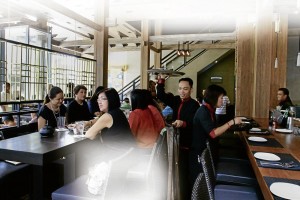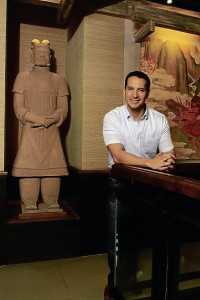In the restaurant business, wisdom is the dividend
When a man was looking for Bonifacio High Street, the cab driver took him to a new Chinese bistro with a terra cotta warrior horse on the façade. Only a month old, P. F. Chang’s at the W Global Center has become a hot spot in Bonifacio Global City.
The second branch of P.F. Chang’s is just one of the many restaurants that Global Restaurants Concept Inc. (GRCI) is opening in 2013.
GRCI president and CEO Armando Charles Rodriguez—Archie to many—is casually dressed in a light blue shirt and jeans. Looking boyish at 41, he appears buffed due to a daily workout routine that alternates weight resistance, yoga and running. Over lunch, he savors the Shanghai cucumbers with sesame seeds and the stir-fried noodles.
Rodriguez recalls that while growing up, he shuddered at the thought of MSG and the grease of Chinese food. Five years ago, while visiting his brother in Florida, they went to P.F. Chang’s, known for its Pan-Asian cuisine. After a 45-minute wait, Rodriguez found himself immersed in the dining experience and was taken in by the freshness of the fare.
After some research, he discovered that P.F. Chang’s was voted Most Popular Dining Establishment Franchise by Zagat and was one of America’s top 10 must-go places.
Emotional experience
Rodriguez says that if P.F. Chang’s could convert him into enjoying Chinese food, then the concept would succeed in the Philippines.
Since W Global Center is a joint venture between the Wee family and GRCI, the restaurant group will be moving its headquarters there. Ihop, an American institution famous for its pancakes, will be opening next to GRCI’s first franchise, California Pizza Kitchen. Mad for Garlic is South Korea’s interpretation of Italian food. Gyu Kaku, a famous Japanese barbeque chain, is renowned for its choice meats.
GRCI’s portfolio also includes stakes at chef Stephanie Zubiri’s Modern Epicurean Kitchen, and TV personality Vivienne Tan-Vaca’s My Street Singapore at Megamall. At Rockwell Power Plant, Morelli’s gourmet gelato boasts of the world’s best pistachio and lemon sorbet flavors.
On the selection of franchises, Rodriguez says it’s all about gut feel and a pleasant dining experience. The verdict of his children, who are the toughest to feed, validates his choice.
“Most of the brands we acquire stir up an emotional experience,” says Rodriguez. “I’m an ice cream lover. When I went to Morelli’s at Harrod’s in the UK, I had one scoop after another. In one sitting, I had five scoops. I couldn’t stop eating.”
Barring construction delays, GRCI hopes to end the year with 28 restaurants and will employ close to a thousand. After 15 years of experience, the company is quite bullish over its prospects.
Light bulb moment
For Rodriguez, the one virtue that has helped him succeed in his personal and professional life is patience. For instance, to woo the principals of California Pizza Kitchen, he sent them an updated business proposal every quarter for some years. Also, when designer Bea Valdes, his significant other, asked him to remove the beads of a prototype purse, Rodriguez spent four days undoing every detail.
After graduating from Rollins College in Florida, majoring in computer science and economics, Rodriguez sought his luck in the Bay Area in California. Although he got accepted in both Oracle and Sega, he favored the video games developer over the database company. In 1992, he started as a network engineer in the consumer services department. He learned how to run call centers when he became the assistant manager of the gaming tips center. Then he was transferred to the IT department as the network manager, building wide area networks, e-mail and database systems way before they were introduced in the Philippines.
By the time Rodriguez got home to Redwood Shores after work, he usually did not have the time to cook. So he found himself frequently ordering from California Pizza Kitchen. After several months, he decided to check out CPK at the Hillsdale Mall. He found that the restaurant was always packed, and customers would be issued beepers so they could be paged anywhere in the mall to let them know that their tables were ready.
A light bulb moment struck Rodriguez: He decided to bring the restaurant to the Philippines. He observed that CPK’s diverse menu and its international influences, such as the Tandoori Chicken Pizza, Thai Pizza and Barbeque Chicken Pizza, appealed to a wide market.
In 1995 during a Christmas break in the Philippines, Rodriguez was amazed at the queues at TGI Friday’s in Glorietta.
“That’s what drove my quest to acquire CPK,” he recalls. Right away, he sent a letter to CPK officials in Los Angeles. At that time, all CPK branches were company owned.
In 1996, Rodriguez came home to start a business, Wired Network Connectivity Solutions, which built e-mail systems and networks for companies. However, his workers were often pirated by other companies an, most of the time, he ended up doing the structured cabling himself.
After three years, he sold his company. But through it all, he continued to pursue CPK.
“When you pursue these brands, regardless whether [they are based in the United States] or other countries, what you’re doing is promoting the Philippines—the people, economy, and why the brand makes sense in the market. You have to use all industries to support your projections and defend it. Back then, it was difficult to promote the Philippines. A lot of people were ignorant of what it was. You have to explain how they can pursue development in Southeast Asia with the Philippines as an entry point … because of our English-speaking skills and our affinity to western culture. That convinced them,” he says.
Rodriguez recalls CPK founder Larry Flax’s jest when he came for CPK Philippines’ 10th anniversary in 2008.
“We didn’t know what the Philippines was, and it was so far away. If something wrong happened, nobody would hear about it,” Rodriguez quoted Flax as saying.
In reality, it was Rodriguez’s dogged persistence and lucid business plan that convinced CPK to hand out its first franchise to him.
Too much too soon
In 1998, Rodriguez and his long-time friends, Jean-Henri Lhuillier and Manuel Zubiri, made their first foray into the restaurant business. What started out as a round of drinks over at Lhuillier’s house ended up with Tequila Joe’s bar on Kalayaan Avenue.
When Rodriguez acquired the CPK franchise, he asked his father, brother and buddies to help. Other pioneer investors included Griffith Go and Al Santos. The first branch outside the United States was also the largest. California Pizza Kitchen at Glorietta 3 was all of 1,100 square meters and 600 seats.
The success of GCRI’s homegrown concept, Tequila Joe’s, and the CPK franchise drove the group’s rapid expansion.
“From 1998 to 2001, we went from one restaurant to 19. We grew from zero to 900 employees at our peak. We grew too fast,” he says, explaining that it all happened just as Asia was emerging from a financial crisis. “The recession took its toll on businesses. We ended up closing many of [the restaurants]. We didn’t have the right people—the right management in place.”
Hasty development made the operations unwieldy, and Rodriguez found it difficult to maintain quality control. Some stores were put up in the wrong places.
“Because of rapid growth, we weren’t focused on getting the right locations. They are critical to success. Then there’s timing. Today they are talking about the better burger restaurant. In the US, it’s 5 Guys, In and Out Burger, Shake Shack. In the Philippines, it’s Brother’s Burger. In 1999, we had Buddy’s Burger with four branches. Although it was good food, people weren’t ready for it. You can be an innovator, but at the right time. Timing is everything.”
Despite the failures, Rodriguez cites wisdom as the biggest dividend in the business. From 2003 to 2007, GRCI went into a period of reassessment and strengthening its corporate structure. In 2007, GRCI, led by a wiser management, evolved into a family dining concept group and started to acquire new brands and establish new locations.
Delegating responsibilities was a key factor that allowed GRCI to become a better restaurant operator.
“We hired and developed the right people to manage,” explains Rodriguez. “It’s a fantastic team that is self-motivated. We do less micro managing today. That was our mistake. As young managers then, we were trying to get involved in everything. You can’t be a jack of all trades. You’ll be a master of none.”
Critical thinker
Rodriguez is tasked to provide opportunities for growth.
“My role is to find new locations, new opportunities, look for new brands, and to create an environment where our people can continue to excel. I always tell them I can provide you with a door that you’re able to knock on. I’ll open that door. It’s your choice to come in and be successful.”
He applies computer intelligence in the restaurant business, and not just in the company’s systems network.
“The most crucial skill that I learned as a computer programmer is that things happen based on processes. If your processes aren’t right, then the end result will not be right,” says Rodriguez.


